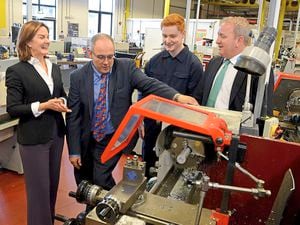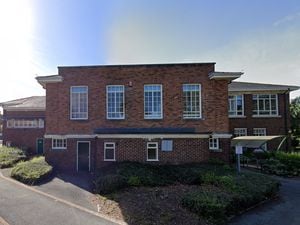This is the future, says top MP during college visit
Telford is leading the way when it comes to preparing young people for the jobs of the future, said a senior MP during a visit to the town's college.

Rob Halfon, a former education minister and chairman of the parliamentary select committee on education, made the comments during a visit to the automotive and engineering departments at Telford College on Thursday. Earlier in the day he had visited Wrockwardine Infant School, where he watched children as young as five learning robotic skills.
During the visit, organised by Telford MP Lucy Allan, Mr Halfon chatted with staff and students. Mark Pritchard, MP for The Wrekin, also attended.
Mr Halfon said the skills being taught at the college, particularly with regard to artificial intelligence, put the town at the forefront of what is described as the 'Fourth Industrial Revolution'.
"It has been estimated that 28 per cent of the jobs that people do at the moment will be obsolete by 2024, they will have been replaced by technology," he says.
"What this college is doing is giving students the skills to adapt to those changes and do the jobs that will be required in the future.
"I'm passionate about skills and apprenticeships, and what this college is doing is fantastic, I think there are 1,000 students doing apprenticeships, and this is giving them the chance to those people to climb the education ladder."
Mr Pritchard said Telford and Shropshire had an exciting future as a centre for new technologies, but added that there was also a skills shortage in the area.
"Places like this automotive centre are a great example of the education sector working with the private sector to meet the educational needs of employers," he said.
Spin-off
"I think the automotive sector is very strong in the UK, but the spin-off is that the skills that are being taught in artificial technology and nanotechnology can be used in a wide variety of engineering applications.
"By working with companies like BAE and GKN, Telford College is giving local people the skills so that employers won't need to go out of the borough or the county in future.
"This is the birthplace of the first industrial revolution, and there's no reason why Telford can't again be leading the way in the fourth industrial revolution."
During the visit, Mr Halfon spoke to 16-year-old Jordan Stevenson from Shrewsbury, who showed him the welding equipment he was using.
Mr Halfon said he would also be raising a suggestion by engineering lecturer Jim Welch that schools should be working with colleges and business to introduce apprenticeship schemes for children as young as 14.
Mr Welch said some years ago the college operated such a scheme where youngsters spent three days a week at school studying academic subjects, one day at college doing a vocational course, and a fifth day on work experience with an employer.
Mr Halfon said it was an interesting idea which he would look into when he went back to Westminster.
Ms Allan, who is also a member of the education select committee, said for too long further education had not been given the same priority as schools and university.
But she said the work that was being done at Telford showed it played a huge role in equipping people for the jobs of the future.
Important
"It's so important for Telford that we have these skills, it's so important for our businesses."
She also praised the college for its work encouraging women to take up careers in engineering.
Paul Hinkins, chairman of the college board, said the automotive industry faced a massive shake-up in the years ahead, and the college had a crucial role in equipping people with the skills to do that.
"Years ago, people were being told to buy petrol cars, then it was diesel, but in future it will be electric vehicles, and it is crucial that people who work in the automotive sector are trained to maintain them," he said.
"In 20 or 30 years' time you won't take your car into the garage for an oil change, you will simply plug it in to be decoded.
"Another challenge will be producing the electricity to power the cars, and creating the infrastructure of charging points.
"If you go back 50 years to when this was a new town, people made things by gluing widgets together. Today it is all done by robots, and it is the students and the academics who will be programming these machines."
Mr Hinkins added that the college would be launching its new virtual reality suite on December 13. This would enable students to perform task such as working on cars through their computer screens, he said.
The £3.5 million automotive centre at the college’s Haybridge campus includes three state-of-the-art specialist workshops, one of which is sound proofed for engine and chassis testing.
The college has also invested heavily in a test lane for MOTs, a chassis dynamometer, engine testing and fault diagnostics, plus computerised four-wheel alignment.
Principal Graham Guest said: “It’s important for students to get the chance to work in real-life workshop conditions, and to be taught by industry-trained professionals with a wide breadth of specialisms."





